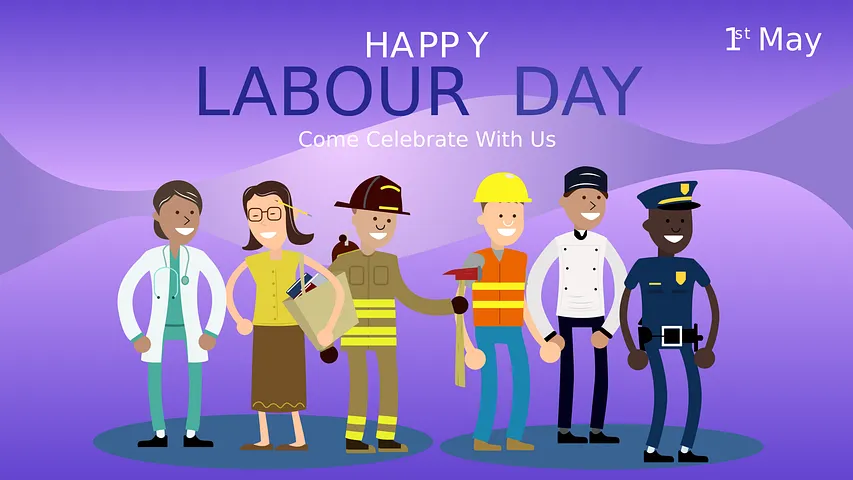Labour Day or May Day is celebrated on May 1st every year, as a tribute to the hardworking labor force around the world. It is an important holiday that celebrates the contributions and achievements of workers, who are the backbone of any society. This day has a rich history and is celebrated in many countries around the world.
The origins of Labour Day can be traced back to the 19th century, when workers across the world were fighting for better working conditions, higher wages, and shorter working hours. In the United States, it was the labor movement that played a pivotal role in the establishment of this holiday. The Federation of Organized Trades and Labor Unions of the United States and Canada held the first-ever Labor Day parade in New York City in 1882.
Since then, Labour Day has become a global celebration, with countries around the world acknowledging the vital role that workers play in their economies. In many countries, this day is observed as a national holiday, with schools, banks, and government offices remaining closed.
However, despite the progress that has been made in the last century, there are still many challenges faced by workers around the world. Many workers still face exploitation, discrimination, and unsafe working conditions. The COVID-19 pandemic has only exacerbated these challenges, with workers being forced to work longer hours and in dangerous conditions.
As we celebrate Labour Day this year, it is important to reflect on the progress that has been made and the challenges that still lie ahead. We must continue to fight for the rights of workers, and ensure that they are treated fairly and justly. This means advocating for better working conditions, higher wages, and shorter working hours. It also means pushing for policies that protect workers' rights and ensure that they have access to healthcare, education, and other basic necessities.
In conclusion, Labour Day is an important holiday that celebrates the contributions and achievements of workers around the world. While there have been significant strides made in improving the lives of workers, there are still many challenges that need to be addressed. As we celebrate this day, let us reflect on the progress that has been made, and continue to fight for a better future for all workers.
The theme of this year's Labour Day is "Recover better - Stand with Workers". The theme highlights the importance of building a more inclusive and sustainable post-pandemic world that supports workers and their families. The COVID-19 pandemic has had a profound impact on the global workforce, with millions of workers losing their jobs and struggling to make ends meet.Governments, employers, and workers' organizations must work together to create a sustainable and equitable recovery that benefits everyone. This means investing in healthcare, education, and social protection, as well as creating jobs and ensuring that workers are protected from exploitation and discrimination. It also means prioritizing the needs of vulnerable workers, including women, migrant workers, and those in the informal economy.
On this Labour Day, it is also important to acknowledge the vital role that essential workers have played in the fight against COVID-19. From healthcare workers to grocery store clerks, these workers have put their health and safety on the line to keep our societies functioning. We owe them a debt of gratitude and must work to ensure that they are protected and supported in the months and years to come.
In addition to celebrating the achievements of workers and advocating for their rights, Labour Day is also a time for celebration and relaxation. Many countries have their own unique traditions for celebrating this day, from parades and picnics to cultural events and performances. It is a time for workers to come together and enjoy the fruits of their labor, and to reflect on the importance of solidarity and community
In conclusion, Labour Day is an important holiday that celebrates the contributions and achievements of workers around the world. This year's theme of "Recover better - Stand with Workers" highlights the need for a more inclusive and sustainable recovery that supports workers and their families. As we celebrate this day, let us remember the importance of advocating for the rights of workers and building a more equitable and just society for all.
One important aspect of Labour Day is the recognition of the role that trade unions have played in advancing the rights and interests of workers. Trade unions are organizations that represent workers in negotiations with employers, advocating for better working conditions, wages, and benefits.
Trade unions have played a crucial role in the history of the labor movement, and have been instrumental in securing many of the rights and benefits that workers enjoy today. From the eight-hour workday to paid vacation time and sick leave, many of the workplace benefits we take for granted were won through the efforts of trade unions.
On Labour Day, trade unions often hold rallies, marches, and other events to celebrate the contributions of workers and to call attention to the issues that are facing workers today. These events are an opportunity for workers to come together and voice their concerns, and for trade unions to showcase their advocacy on behalf of workers.
Another important aspect of Labour Day is the recognition of the importance of education and training for workers. Many organizations and institutions offer courses and training programs to help workers develop the skills they need to succeed in their jobs and advance their careers.
Labour Day is also a time to recognize the contributions of workers from different backgrounds and cultures. In many countries, this day is an opportunity to celebrate the diversity of the workforce and to acknowledge the unique challenges faced by different groups of workers, such as women, people of color, and LGBTQ+ individuals.
In conclusion, Labour Day is a holiday that celebrates the contributions and achievements of workers around the world. It is a time to reflect on the progress that has been made in advancing the rights and interests of workers, and to consider the challenges that still need to be addressed. Through advocacy, education, and solidarity, we can continue to build a more just and equitable society that supports workers and their families.









0 Comments